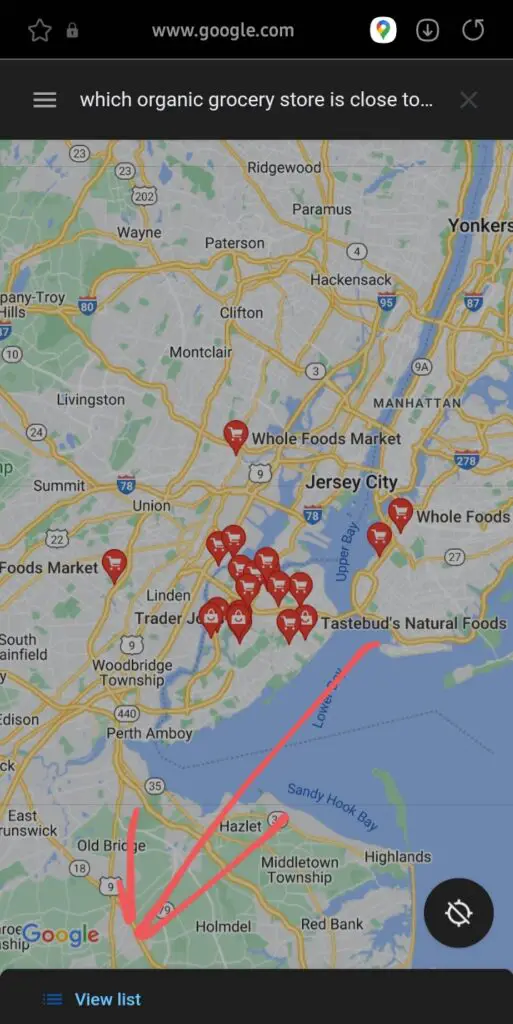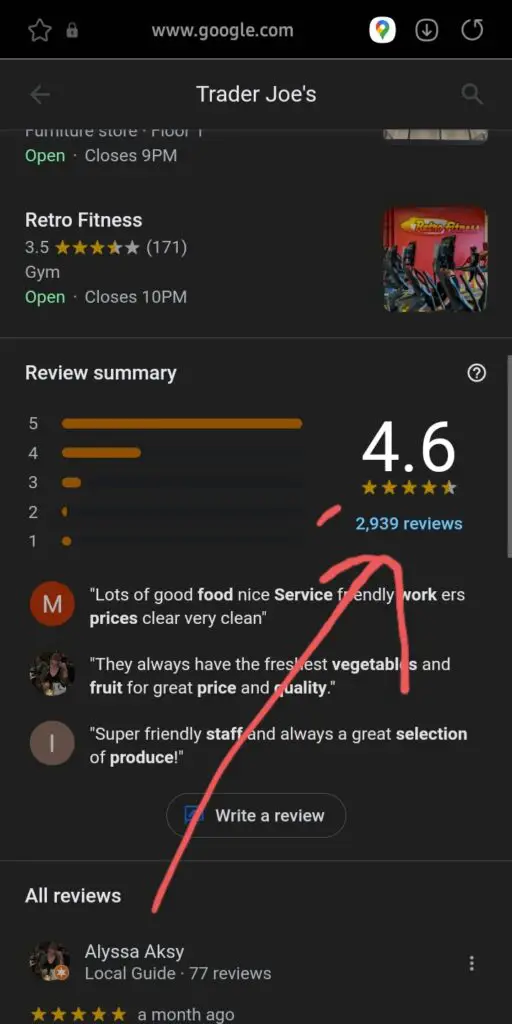Locating places, event centers, and grocery stores in the present day is no longer as complicated as it used to be. Now we have access to Google Maps, which can take us directly to our desired destination. Locating organic grocery stores shouldn’t be that hard.
- Search for which grocery store is closest to you on your mobile device, laptop etc.

- Tap on Maps
- Map view

- Tap on any store You see “Open”

- Tap on “Directions.”

- You can also scroll to read reviews and see rating.

Is all of Aldi’s produce organic?
When speaking of really affordable organic products or foods, Aldi definitely comes into discussion. For a long time, they have been in the spotlight not just for their affordable products but also because the products sold by Aldi are very beneficial and healthy for consumption.
They are also a very good option for families going grocery shopping on a budget. Over time, Aldi has really stepped up their game in ensuring that consumers’ health is a priority, keeping them in competition with other food stores.
So we ask, since they are taking this huge step for consumers’ health, does that mean all their products are organic? Well, from statistics over the years, the store has ended terms with quite a number of pesticides and chemicals, approximately 8 of them.
Same action, taken towards artificial flavorings. This enabled them to adopt different production methods for the organic foods, which are now only lower priced compared to those in Walmart or other grocery stores. This doesn’t make others less quality. As a matter of fact, in terms of quality, there is no real difference.
The store, compared to its former self, where they only had the basic organics, has done a great job of stocking themselves with lots of organic foods. Some of the brands you come across at an Aldi store are simply nature, fit&active, liveGfree, etc. While the extra stocked organic foods are water melon, segmented mango, strawberry Kefir etc.
Is Trader Joe’s all organic?
There are grocery stores in the United States, but when we talk about the store most loved in the States, it definitely has got to be TJ’s. I mean, what’s not to love about this store? From the chatty workers, dressed in Hawaiian shirts, to the awkward puns, or their high quality meals sold at fair prices, I mean, Trader Joe’s is the place.
You may wonder, do they sell organic groceries or are all their groceries organic? Well, the answer to your lingering question is no. Not all of their products are organic, although their products in a fair ratio are fine. Although this store does advertise as a whole food or gourmet market, there might be a similarity.
It will interest you to know that Trader Joe’s does not use artificial flavors or even preservatives in their products, but the private labels of Trader Joe’s are dignified and top-notch. The store takes the liberty to give assurance to their customers concerning their products that they are free of any GMO ingredients.
Trader Joe’s also professes to market an estimate of four times more organic foods than your regular grocery store. And their organic products, when compared to those from other stores, are even less costly.
What’s the difference between Trader Joe’s and Aldi?
Of course, they are both grocery stores in the United States, but there are outstanding variations between Trader Joe’s and Aldi. One interesting thing you need to know is that both grocery stores were, at one time, owned by the same company. Follow me as we take a survey on the difference between these two stores.
One major variance between these stores is what we’ll call product selection. While Trader Joe’s is more of a fascinating, superior product that may be eccentric, Aldi’s is more of the basics, which are not costly. They focus on giving customers access to multiple products in their store at a very low cost.
Another difference is the cost of items in these shops. It is evident that items in both shops are at reasonable prices, but in events where you are on a strict budget and you actually want to spend less as you shop, Aldi is definitely where you’d want to go to do your shopping. Trader Joe’s is definitely a good option, but when it comes to pricing, Aldi is off the charts.
The third point in their difference is price cuts and sales. Trader Joe’s definitely sets a line for this one. For Trader Joe’s, sales is sales. There is not a single provision for price slashing or coupons. Not that you won’t get reasonable amounts and quality.
You still get good deals. Meanwhile, at Aldi, despite not having coupons, there is a provision for various discounts throughout the week. One thing about these two stores is their excellent return policy, which in a way might be similar.
Lastly, let’s look at the location of both stores. Let’s just say, there are more Aldi’s in the States than there are Trader Joe’s. While there are about 500 Trader Joe’s stores across the state, which is not even up to one third of the 2000 Aldi stores in about 36 states in the United States. Delivery service is also a lot easier at Aldi than at Trader Joe’s.
How do you shop organic for less?
Eating organic food is more preferable than the consumption of conventional food. However, while shopping for organic food, we tend to find ourselves in situations whereby we have to almost empty our pockets before we get something satisfactory because of the price tag.
As a matter of fact, the notion of attributing organic food to the wealthy class needs to be changed as anyone can get organic food.
Follow me as we look at some tips that will help us introduce organic meals into our everyday diet without having to break the bank or empty your pockets.
The first thing you’ll need to do to achieve this is to make your list in order of priority. Now, you do need to get everything organic so as not to end up spending an excess. You will need to identify that food which you absolutely must eat as organic, as this will assist you to select more confidently without being in between options.
The second point is that you should try to patronize local farms. By getting directly from local farms, the additional profit put in by the grocery store is removed, thus helping you spend less. Also, purchasing from a local farm limits you to in-season meals and is an interesting way to try out preparing dishes with vegetables you would not normally get from the store.
Try to search for the best and most affordable deal while shopping for your organics at the grocery store and try to make bulky purchases, especially on herbs, nuts, oats, flours, etc. This gives you control over how much you need.
Try as much as possible to search for store brands as most big stores will most of the time sell their own organic brands, which happen to be cheaper than conventional products.
Lastly, you can grow your own organic foods in your garden or open areas of your yard.
Does organic food go bad faster?
One thing that makes food last is the method you adopt in preserving these foods or the preservatives used. Also, unlike conventional products, these organics are not treated with any chemicals or whatsoever, making them much more preferable for a much healthier diet.
Yes, organic foods have a shorter shelf life when compared with conventional foods. Why? Because they are cleaner, have no chemicals introduced into them as preservatives or whatsoever, and because of this, they are more prone to bacteria or fungus, thus the reason for the short shelf life of organic foods.
Is Whole Foods really organic?
Well, let’s look at these terms: whole and organic. Whole refers to untouched, so whole food is a term we might want to use to describe foods that have not been processed, composed, etc. Organic food is obtained by producing food in accordance with organic farming principles.
Let’s analyze this first: whole foods. They are not yet processed, meaning they are free of any external chemicals. Examples are meats, fish, poultry, nuts, etc. While organic foods are natural foods whose growth is not influenced by antibiotics, they are free from antibiotics. Examples are eggs, poultry, fish, and meat & dairy. From the above example, we can identify whole foods as organic to an extent.
What foods are most important to eat organic?
While some professionals or food experts advise consuming mainly organic foods, others would advise against it, backing conventional foods. While this debate goes on and on, research is ongoing. Meanwhile, there are foods that should preferably be consumed in organic form.
Let’s look at some foods that you must eat organically. What was used to arrive at this list is the towering pesticide remnants in these foods. They are figs, rhubarb, mushrooms, beetroot, avocado, onions, sweet potatoes, radishes, cucumbers, spinach, cherries, etc. Always try to get these fruits and vegetables in their organic state.
Can you lose weight by eating organic?
Organic food is a general term we use to refer to foods that are farmed without introducing synthetic chemicals into them, such as hormones, antibiotics, etc. The absence of chemicals in these simply means that you’re less likely to develop an addiction, which in turn would have led to weight gain.
In summary, eating organic foods may be a much healthier option that can help promote weight loss as well as supply necessary nutrient requirements for the body.
